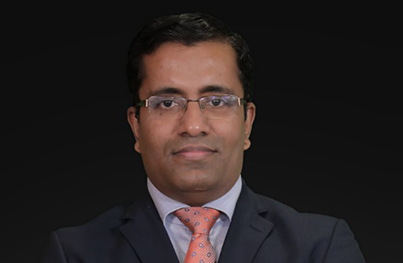Investors who want to benefit from improving growth prospects of Indian economy should participate in this fund
BFSI Industry Interview

Mr. George Heber Joseph joined ITI Asset Management Ltd. in November 2018 and is responsible for the entire business at ITI Asset Management Ltd.
George has around two decades of experience and has held positions in Equity Research, Fund Management, Treasury Management and Management Consulting. Prior to joining ITI Asset Management Ltd., he has worked in companies like ICICI Prudential Asset Management Ltd., Tanfac Industries Ltd. (Aditya Birla Group), Cholamandalam Investments & Finance Co. Ltd., Met Life India, Wipro and DSP Merrill Lynch Ltd. based in India and abroad.
His last stint was at ICICI Prudential Asset Management Co. Ltd. Mumbai, where he spent more than a decade managing some of the large flagship fund strategies in the equity and hybrid categories with assets under management exceeding Rs. 10,000 crores. All funds (Multicap, ELSS - Long Term Equity Fund, Child Care) and discretionary portfolios (Wellness, Exports, Flexicap, Largecap, PIPE/Smallcap) managed by him during this entire period were excellent performers in their respective categories. There, he was designated as Senior Fund Manager (Vice President Grade) based in Mumbai, India and was one of the Key Management Personnel in the company and was part of the investment management team.
He is known for his focus on extensive bottom-up research and stock picking capabilities, has overseen fund manager's activities, managed various research analysts during his tenure.
Mr. George holds dual Bachelor's Degrees in English Language & Literature and Commerce. He is a qualified Chartered Accountant from Institute of Chartered Accountants of India, New Delhi and a Cost and Management Accountant of India from Institute of Cost Accountants of India, Kolkata.
What is your outlook on the Indian equities in the current economic environment? What are your views on valuations at current levels?
We continue to remain bullish on Indian equity markets over the next three to five years. The key reason for our bullishness is the prospects of improved earnings growth. The ratio of corporate profits to GDP was 3% in FY20, a level last seen in 2003. The period of good earnings growth has just started for India after a long period of lacklustre growth. That does not mean markets will move up in linear fashion. The bull run of 2003-2007 also had several corrections where markets fell in excess of 10%. I remember during May-June 2006, Nifty / Sensex had a correction of over 20% in just two months. Thus, corrections may come but that does not alter the medium term picture.
Valuations today are at the higher end of historical ranges. A key reason for relatively high valuations when compared to the historical range of last 10 years is the cost of capital. We have not had such low real returns (nominal yield less inflation) for quite some time. In the last decade, while nominal rates were low, real rates were not this low as inflation was also low globally. We are now seeing a return of inflation and hence despite some rise in interest rates, real rates remain low which has resulted in high valuation multiples. We feel the real rates will remain low for quite some time supporting valuations.
What are your views on inflation and trajectory of interest rates?
We have seen a return of inflation after a long period of low inflation. Part of the inflation is due to supply side disruptions, some partly due to Covid related restrictions on movement of goods and people. This part of the inflation is more transitory in nature and will retrace in a few months. However, with demand increasing as economic activity normalises and monetary policy still accommodative, inflation is likely to be higher than what we have seen in the last five-seven years. That is not necessarily bad for equities. We expect interest rates to rise only gradually as Central banks would like to be sure of the strength of economic recovery before they increase rates.
Bank Nifty has underperformed the Nifty in 2021. What is your medium to long term outlook on the Banking sector?
We are very bullish on the prospects of banking sector. Indian economy is coming back on the growth path. All the sectors that traditional banks are exposed to such as infrastructure, real estate, metals, capital goods are seeing improved performance. The legacy NPA issue is behind us. We expect capex cycle to improve in the next two years on the back of demand recovery and better financial health of corporate sector. Banks are well capitalised to fund this growth. Retail and MSME sectors are improving after the shocks of two covid related lockdowns and recoveries are improving. Thus banks can see good growth with improving asset quality from all three sectors viz. corporates, retail and MSME. The non-lending part of BFSI sector ie insurance, AMCs, depositories, brokerages and exchange, have secular growth with less cyclicality and low capital requirements. So after a long gap, we see all sub-sectors of BFSI doing well simultaneously. Hence the time is appropriate to launch the ITI Banking and Financial Services fund.
What will be the stock selection strategy of the scheme?
The fund will run a concentrated portfolio of 20-30 stocks. We will employ flexi cap strategy and invest across market caps in stocks that offer the best risk return profile. The fund will invest in both lending (banks, NBFCs etc) and non-lending (insurance, capital market related players, rating agencies etc) segment of the BFSI sector. Portfolio will have a healthy mix of market leaders, fast growing companies and turnaround play. We may take significant bets away from benchmark to generate alpha.
Who should invest in the banking and financial services fund? What is the minimum recommended investment horizon for this fund? What is your advice to investors?
Investors who want to benefit from improving growth prospects of Indian economy should participate in this fund. BFSI sector is high beta sector and hence in times of economic recovery, generates better alpha than the benchmark indices Investors should have a three to five year horizon to fully realise this alpha.
Mutual fund investments are subject to market risks, read all scheme-related documents carefully.
Recent Interviews
-
In conversation with Mr Vaibhav Shah Head Products: Business Strategy & International Business Mirae Asset Mutual Fund India
Apr 18, 2025
-
In conversation with Mr Kaustubh Sule Senior Fund Manager Fixed Income with Groww Mutual Fund
Apr 18, 2025
-
In conversation with Mr Abhishek Tiwari Chief Business Officer of PGIM India Mutual Fund
Apr 5, 2025
-
In Conversation with Mr Akhil Chaturvedi Executive Director & Chief Business Officer with Motilal Oswal Mutual Fund
Mar 26, 2025
-
In conversation with Mr Rohit Seksaria Fund Manager Equity with Sundaram Mutual Fund
Mar 7, 2025
Fund News
-
Axis Mutual Fund joins ONDC Network to Expand Access to Mutual Fund Investments
Apr 18, 2025 by Axis Mutual Fund
-
Nippon India Mutual Fund launches Nippon India Nifty 500 Quality 50 Index Fund
Apr 18, 2025 by Advisorkhoj Team
-
Nippon India Mutual Fund launches Nippon India Nifty 500 Low Volatility 50 Index Fund
Apr 18, 2025 by Advisorkhoj Team
-
RBI Monetary Policy: RBI changes policy stance and lowers rate
Apr 9, 2025 by Axis Mutual Fund
-
Kotak Mahindra Mutual Fund launches Kotak Nifty Top 10 Equal Weight Index Fund
Apr 7, 2025 by Advisorkhoj Team




